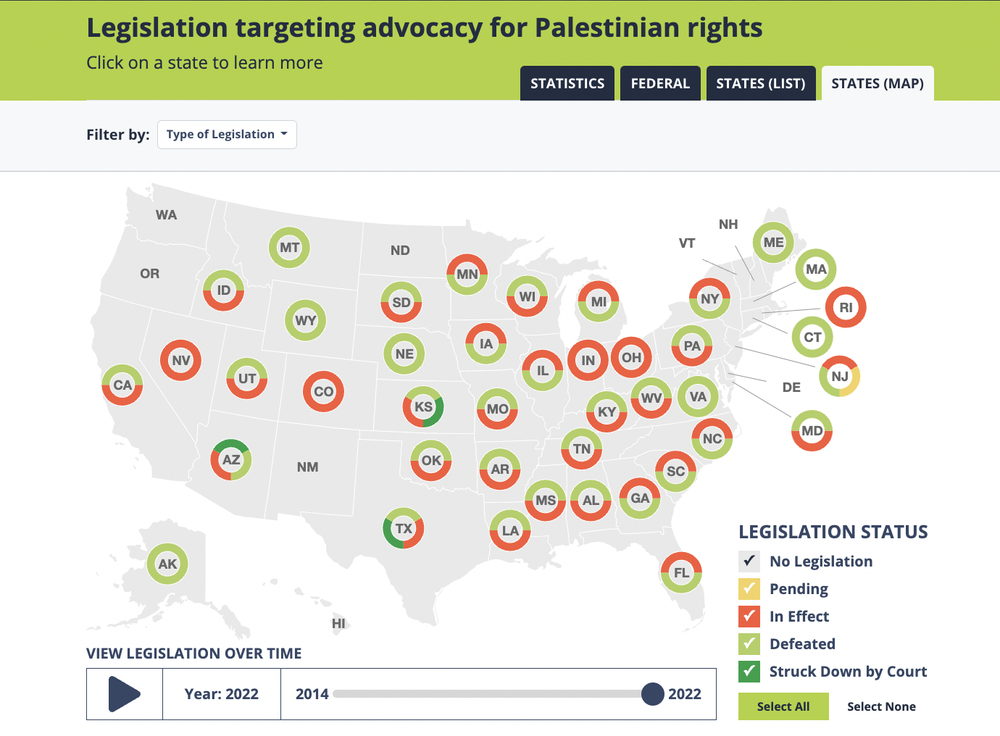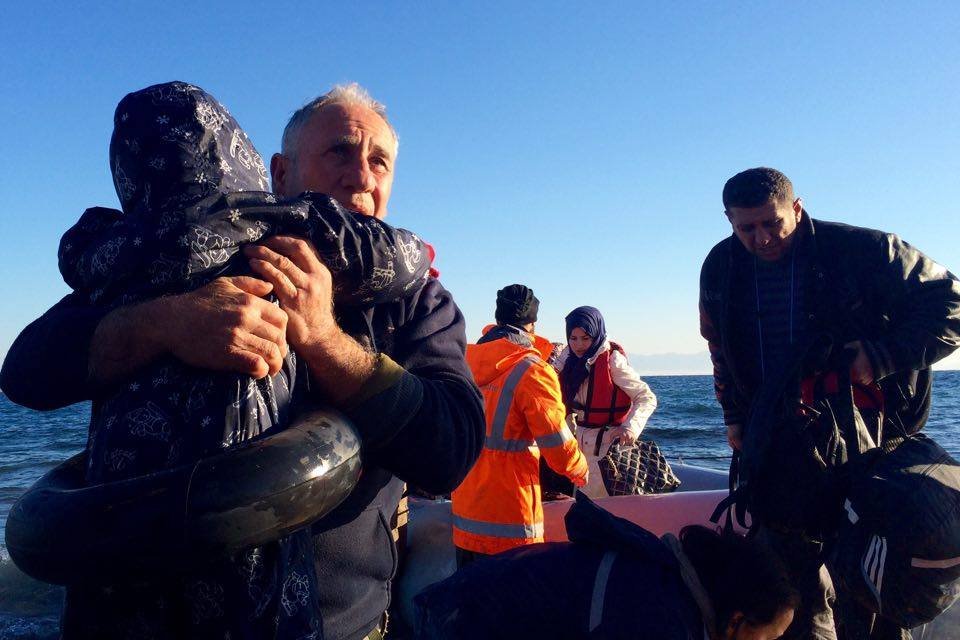Criminalizing Solidarity: The Eternal Fascist Playbook
Activists assist migrants arriving by boat on the Greek island of Lesvos. (Photo: Diego López Calvin)
Every day the headlines bring us more stories of governments viciously cracking down on people and movements that seek to support and bear witness to the struggles of those experiencing dislocation, structural violence, and racist abuse. Just yesterday, February 26, the tragic news of 59 migrants from Iran, Pakistan, and Afghanistan drowning off the coast of Italy was accompanied by news that far-right Italian Prime Minister Giorgio Meloni is redoubling her efforts to criminalize those in her country who want to help migrants reach safe harbor. (As of this publication, authorities have revised the death toll from the shipwreck up to 62.)
Across the Mediterranean in Tunisia, President Kais Saied has been spewing out racist accusations against migrants from sub-Saharan Africa. Describing them as “hordes,” Saied went up to his neck in a classic fascist trope: using the language of demographic “threats” to pit ordinary people against each other and undercut grassroots alliances for justice. Undeterred, Tunisians took to the streets and called the President out, chanting, “Down with fascism!” and demanding an official apology.
Here’s the thing: Fascists hate solidarity. At a minimum, they want you to laugh at people who embrace the solidarity impulse and who act accordingly. At a maximum, they want you to support the criminalization and violent suppression of this impulse. What this means is that acting out of solidarity is a fundamental part of the larger project of fighting fascism - a project whose global urgency is growing by the day.
Dangerous solidarities
Reading about these stories led me to reflect on my own experience of learning about and participating in efforts to build solidarity with Palestinians living under settler colonial domination at the hands of Zionism and the state of Israel.
Roughly 20 years ago, two of my students and I received a fellowship from my university to go to Palestine and study the role of international solidarity activists there. We wanted to learn not only how this form of activism functions on the ground, but also how Palestinians themselves were perceiving the presence of solidarity activists in their communities.
“We know where the fascists stand on these issues. They stand on the side of fomenting hatred, preventing people from helping migrant boats reach the shore, tarring nonviolent activists with the brush of “terrorism,” and empowering those who profit from barbarism. Their goal is to stamp out the solidarity impulse altogether. Which side will we stand on?”
Our plans fell through when the students were arbitrarily denied entry into Israel just before we were to begin the research. Upon returning to the US, they spoke with a reporter from a regional newspaper who had heard about their story. When the newspaper published an article explaining what had happened to them, a resident of the town where I live and work responded by writing a letter to the editor. In it, he directly accused me of “teaching terrorism” in my classroom.
While the letter obviously troubled me as a young faculty member, it also revealed something important: that the Zionist project in Palestine requires the policing of the solidarity impulse. As anyone who has been a part of the global movement for justice in Palestine knows, this policing takes many forms, from well-organized campaigns to destroy people’s careers to seemingly inconsequential articles in local newspapers.
Reformulating solidarity as “terrorism”
This small example from my own experience also tells us something about how the attacks of September 11, 2001, opened up additional ideological space for those who wish to attack the solidarity impulse. In particular, the author of the letter targeting me was drawing on the idea of “terrorism,” an old concept given new life through the US response to 9/11 and the declaration of an open-ended, “global war on terrorism.”
“In the case of Europe, despite occasional examples to the contrary, recent decades have seen what amounts to a massive, pan-European effort to avoid taking moral responsibility for the conditions - war, poverty, hopelessness, environmental destruction - that drive so many from the global south to flee their homes. The criminalization of those who are willing to act on the basis of solidarity constitutes another layer of this failure of responsibility. ”
As many commentators have noted, this new “war” owed a great deal to the example provided by the Israeli state, which had long sought to discredit Palestinian anti-colonial resistance by labeling any resistance as “terrorism” and by flooding the world’s airwaves and academic journals with pro-Israel voices claiming to be “terrorism experts.” This US-Israel relationship came under new scrutiny in recent years as activists responded to high-profile police killings of Michael Brown, Sandra Bland, Eric Garner, George Floyd, and others by spotlighting Israel’s role in training and sharing “worst practices” with US police departments and border patrol agencies.
BDS and beyond
During the same time period, the rise of the nonviolent, Palestinian-led Boycott, Divestment, and Sanctions (BDS) movement has opened up a new space for struggle animated by the solidarity impulse. Not surprisingly, the Israeli state - some of whose own supporters are finally beginning to acknowledge its fascist elements, a point many Palestinians and some prominent Jewish critics of Zionism have been making for decades - has responded to BDS by trying to link it with “terrorism” and by supporting a range of anti-BDS efforts worldwide.
Supporters of Israel in the US have dutifully taken up the work of criminalizing BDS through various forms of legislation and targeting individuals who believe in boycotting as a powerful tool for expressing solidarity and seeking justice for Palestinians. As the film Boycott (which will be available for public streaming on March 1) details, there has been strong and principled pushback against these criminalization efforts.
Map tracking anti-BDS legislation (Image via Palestine Legal)
An important part of the BDS story is the recognition that BDS is serving, in effect, as a laboratory for those who want to criminalize the solidarity impulse across the board. If the right to boycott in support of Palestinians is eliminated, there is little doubt that far-right forces will walk through that door with other measures to criminalize other forms of solidarity work focused on supporting migrants, curbing the power of big banks, fighting climate crisis, opposing militarization, and struggling for police abolition, to name a number of urgent issues.
Solidarity as moral responsibility
Examples such as Giorgio Meloni’s crackdown on solidarity work in Italy remind us that solidarity is ultimately a moral issue. It goes directly to the question of whether we are willing to take responsibility for our own actions and whether we have a responsibility to act to prevent suffering and seek justice.
In the case of Europe, despite occasional examples to the contrary, recent decades have seen what amounts to a massive, pan-European effort to avoid taking moral responsibility for the conditions - war, poverty, hopelessness, environmental destruction - that drive so many from the global south to flee their homes. The criminalization of those who are willing to act on the basis of solidarity constitutes another layer of this failure of responsibility.
Activists assist migrants arriving by boat on the Greek island of Lesvos. (Photo: Diego López Calvin)
Here in the US, we see some disturbingly similar patterns. When four women were arrested, fined, and sentenced to probation in 2019 for daring to leave out food and water for migrants in the Mexico-US borderlands, their supporters understood what was at stake. No More Deaths, the organization for which the women were volunteering, linked the case directly with the issue of rising fascism. “The criminalization of those acting in solidarity,” they noted, “is a classic example of the ramping up of an authoritarian regime.”
Solidarity and anti-fascism
More than 70 years ago, the great Martinican poet and politician Aimé Césaire wrote Discourse on Colonialism, a scathing indictment of Europe’s subjugation of the global south. For Césaire, the deadly combination of rapacious capitalism and racist colonialism amounted to the ultimate proof of European barbarism. He famously identified fascism as the “boomerang effect” of this colonial brutality - the moment when the colonial impulse is turned inward.
Less well known is that Césaire also warned against the rise of the US as the inheritor of this tradition of barbarism:
And now I ask: what else has bourgeois Europe done? It has undermined civilizations, destroyed countries, ruined nationalities, extirpated "the root of diversity." No more dikes, no more bulwarks. The hour of the barbarian is at hand. The modern barbarian. The American hour. Violence, excess, waste, mercantilism, bluff, conformism, stupidity, vulgarity, disorder…I know that some of you, disgusted with Europe, with all that hideous mess which you did not witness by choice, are turning…toward America and getting used to looking upon that country as a possible liberator…And there we are, ready to run the great Yankee risk. So, once again, be careful! American domination-the only domination from which one never recovers. I mean from which one never recovers unscarred.
In 2023, there is no question that fascism is here and growing - indeed, it never left in the first place. Today’s fascism is a response to ongoing ecological and economic collapse and the dislocation they generate. Journalist Naomi Klein foregrounded this issue in her May 2021 analysis of the “climate dystopia” unfolding in northern California, where catastrophic fires in towns like Paradise stoke displacement even as real estate speculation and gentrification generate more wealth for the one percent:
Wildfires, hurricanes, sea level rise, and crop failure and already driving migration globally, some of it between nations but much of it within them…Figuring out how to absorb sudden influxes of new neighbors with decency and hospitality - whether they are fleeing hurricanes in Honduras or fires in Paradise - is a central challenge of our age.
We know where the fascists stand on these issues. They stand on the side of fomenting hatred, preventing people from helping migrant boats reach the shore, tarring nonviolent activists with the brush of “terrorism,” and empowering those who profit from barbarism.
Their goal is to stamp out the solidarity impulse altogether. Which side will we stand on?



